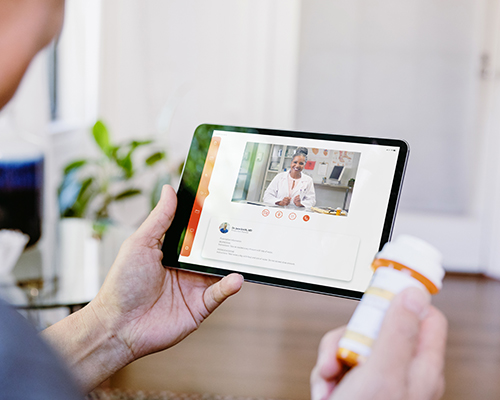
Given the COVID-19 pandemic, you may be thinking twice about going out in public. Visiting your doctor’s office, which at one time seemed like a routine errand, might now feel like a dangerous mission. In recent months, you may have wondered, “Can I see my gout doctor online?” Chances are, the answer is yes. Read on to learn more about telemedicine and how to prepare for a gout telemedicine appointment.
A new take on an old idea
Although telemedicine might sound like a new idea, it has existed in its most basic form for more than a hundred years.1 Shortly after the telephone was invented, a well known medical journal called The Lancet published an article about how using the telephone to discuss non-critical medical concerns with patients could reduce the number of office visits and housecalls.1 Technology and communications have advanced by leaps and bounds since then, and likewise, telemedicine has become increasingly popular.1
The telemedicine candidate
If you are an existing patient at your doctor’s practice and have an established gout diagnosis, a telemedicine session might be a good alternative to a face-to-face appointment.1,2 Imagine it’s the morning after you suffered a late-night gout attack. Instead of getting in your car to go see the doctor in person, you could schedule a telehealth appointment.2 During your gout telemedicine appointment, your doctor would most likely ask questions about your symptoms, consider the details you provide as they relate to the episode, and determine how best to help you manage the flare and your gout.1
Preparing for your gout telemedicine appointment
Are you a first-time telemedicine patient? Here are a few tips to help you get the most out of your virtual doctor visit3:
- Check your equipment—Connecting with your doctor using both audio and video is key to a successful telehealth appointment. You can most likely achieve this with a smartphone, tablet or computer that is connected to the Internet.
- Call your doctor’s office—Be sure to contact your doctor’s office ahead of time to find out if there is a special application (“app”) you need to download and install to either your computer or your smartphone before your appointment. You’ll also want to verify that your medical records are accurate and up-to-date and that any lab work you need has been completed and the results reported to your doctor.
- Confirm your coverage—Be sure to double-check with your insurance company that telehealth visits are covered.
- Prepare some notes—Just as you would with a face-to-face appointment, jot down your questions and/or concerns beforehand. You’ll also want to have handy a list of the prescriptions, over-the-counter medicines and any vitamins and/or supplements you take. Be sure to keep pen and paper nearby so you can take notes during your conversation.
- Clear away distractions—Make sure the volume is turned up on either your phone or computer speakers and camera access has been granted to the appropriate app on your device. Be sure to disable notifications (eg, calls, texts) on your device if using a smartphone, and silence other apps that might make noise so you can give the doctor your undivided attention during your session. Find a quiet, well-lit area where you can sit uninterrupted for the entire call.
Managing your gout between appointments
If you have gout, it is important to stay in close contact with your doctor. While your doctor cannot necessarily cure your gout, he or she can help you manage the condition and maintain your health. If you suffer with flares or are starting urate-lowering treatment (ULT), ask your doctor about colchicine therapy.4 Your doctor may add colchicine (eg, Mitigare® (Colchicine) 0.6 mg Capsules or ) to your regimen to help prevent gout attacks.4
Mitigare® is a registered trademark of Hikma Pharmaceuticals USA Inc.
Colchicine 0.6 mg capsules are contraindicated in patients with renal or hepatic impairment who are currently prescribed drugs that inhibit both P-gp and CYP3A4. Combining these dual inhibitors with colchicine in patients with renal or hepatic impairment has resulted in life-threatening or fatal colchicine toxicity. Patients with both renal and hepatic impairment should not be given Mitigare®.
Fatal overdoses have been reported with colchicine in adults and children. Keep Mitigare® out of the reach of children.
Blood dyscrasias such as myelosuppression, leukopenia, granulocytopenia, thrombocytopenia and aplastic anemia have been reported with colchicine used in therapeutic doses.
Monitor for toxicity and, if present, consider temporary interruption or discontinuation of colchicine.
Drug interaction with dual P-gp and CYP3A4 inhibitors: Co-administration of colchicine with dual P-gp and CYP3A4 inhibitors has resulted in life-threatening interactions and death.
Neuromuscular toxicity and rhabdomyolysis may occur with chronic treatment with colchicine in therapeutic doses, especially in combination with other drugs known to cause this effect. Patients with impaired renal function and elderly patients (including those with normal renal and hepatic function) are at increased risk. Consider temporary interruption or discontinuation of Mitigare®.
The most commonly reported adverse reactions with colchicine are gastrointestinal symptoms, including diarrhea, nausea, vomiting and abdominal pain.
Please see the full Prescribing Information and Medication Guide for Mitigare® for complete product details.
NOTE: This article was not written by a medical professional and is not intended to substitute for the guidance of a physician. These are not Hikma’s recommendations for gout flare prevention, but rather facts and data collected from various reliable medical sources. For a full list of resources and their attributing links, see below.
